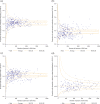Using data linkage for national surveillance of clinical quality indicators for dementia care among Australian aged care users
- PMID: 34021203
- PMCID: PMC8140144
- DOI: 10.1038/s41598-021-89646-x
Using data linkage for national surveillance of clinical quality indicators for dementia care among Australian aged care users
Abstract
Care quality has important implications for people with dementia. We examined trends and geographical variation of four clinical quality indicators (CQIs) in Australia. This retrospective cohort study included all people with dementia using Australian government-subsidised aged care in 2008-2016 (n = 373,695). Quality indicator data were derived from linked national aged care, health, and pharmaceutical datasets. Negative binomial regression modelling assessed trends in CQI performance over time (2011-2016) and funnel plots examined geographical variation in performance. The incidence rate of antipsychotic medicine dispensing decreased slightly from 1.17/1000 person-days to 1.07/1000 person-days (adjusted incidence rate ratio (aIRR) = 0.98, 95%CI 0.98-0.99). Cholinesterase inhibitors and memantine dispensing did not change (aIRR = 1.02, 95%CI 1.00-1.04), while exposure to high sedative load increased slightly from 1.39/1000 person-days to 1.44/1000 person-days (aIRR = 1.01, 95%CI 1.00-1.01). Dementia and delirium-related hospitalisations increased slightly from 0.17/1000 person-days to 0.18/1000 person-days (aIRR = 1.02, 95%CI 1.01-1.03). There was marked variation in cholinesterase inhibitor and memantine dispensing by geographical area (0-41%). There has been little change in four indicators of dementia care quality in Australian aged care users over time. Cholinesterase inhibitor and memantine dispensing varied substantially by geographical region. Existing strategies to improve national performance on these indicators appear to be insufficient, despite the significant impact of these indicators on outcomes for people with dementia.
Conflict of interest statement
MCa has been employed in the last five years to assist with data collection for drug trials funded by Janssen and Merck. All other authors declare no conflicts of interest.
Figures

Similar articles
-
Primary and Secondary Care Related Quality Indicators for Dementia Care Among Australian Aged Care Users: National Trends, Risk Factors, and Variation.J Alzheimers Dis. 2022;88(4):1511-1522. doi: 10.3233/JAD-220336. J Alzheimers Dis. 2022. PMID: 35811530
-
Clinical Quality Indicators for Monitoring Hospitalizations Among Older People with Dementia Accessing Aged Care Services.J Alzheimers Dis. 2023;96(4):1747-1758. doi: 10.3233/JAD-230730. J Alzheimers Dis. 2023. PMID: 38007661
-
Associations between clinical indicators of quality and aged-care residents' needs and consumer and staff satisfaction: the first Australian study.Aust Health Rev. 2019 Apr;43(2):133-141. doi: 10.1071/AH17213. Aust Health Rev. 2019. PMID: 29335089
-
Living well until you die: quality of care and quality of life in palliative and dementia care.Ann N Y Acad Sci. 2007 Oct;1114:194-203. doi: 10.1196/annals.1396.019. Epub 2007 Oct 12. Ann N Y Acad Sci. 2007. PMID: 17934058 Review.
-
Quality indicators for the care of dementia in vulnerable elders.J Am Geriatr Soc. 2007 Oct;55 Suppl 2:S293-301. doi: 10.1111/j.1532-5415.2007.01335.x. J Am Geriatr Soc. 2007. PMID: 17910550 Review. No abstract available.
Cited by
-
Carer-reported measures for a dementia registry: A systematic scoping review and a qualitative study.Australas J Ageing. 2023 Mar;42(1):34-52. doi: 10.1111/ajag.13148. Epub 2022 Nov 16. Australas J Ageing. 2023. PMID: 36383194 Free PMC article.
-
Registry of Senior Australians (ROSA): integrating cross-sectoral information to evaluate quality and safety of care provided to older people.BMJ Open. 2022 Nov 17;12(11):e066390. doi: 10.1136/bmjopen-2022-066390. BMJ Open. 2022. PMID: 36396322 Free PMC article.
References
-
- Reid, R. C. Quality of care and mortality among long-term care residents with dementia. Canadian Studies in Population. 35 (2008).
-
- World Health Organization. Global action plan on the public health response to dementia 2017–2025. (2017).
Publication types
MeSH terms
LinkOut - more resources
Full Text Sources
Other Literature Sources
Medical

